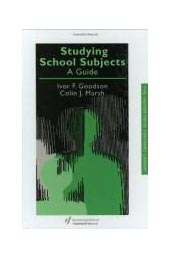Studying School Subjects: a guide
Conclusions, Complexities and Conjectures
Unlike biology and geography, rural studies remained for generations a low-status enclave, stressing highly utilitarian or pedagogic values. Confirming Ben-David and Collins' contention, the move to a change in intellectual and occupational identity came at the time when the subject was faced with survival problems in a reorganising educational system stressing the academic tradition. The pervasive influence of this tradition can clearly be seen in the following quote: 'The lack of a clear definition of an area of study as a discipline has often been a difficulty for local authorities in deciding what facilities to provide... It has been one of the reasons for the fact that no "A" level course in rural studies exists at present.' The Schools Council working party in 1968 confirmed this with the broad hint that there was the 'need for a scholarly discipline'.
With no tertiary base and hence no specialist scholars involved, except random specialists from other disciplines, the Hertford shire strategy was to develop an 'A' level syllabus from groups working in the secondary schools. This offered the promise of tailoring 'a course to the needs of the kids' and not to 'have to meet the requirements of other people's courses'. But the crucial reason in terms of the subject teachers' material self interest was often frankly admitted: 'I think we had got to prove that environmental studies was something that the most able of students could achieve and do something with... if you started off there all the expertise and finance that you put into it will benefit the rest - your teaching ratio goes up etc. and everyone else benefits.' Likewise, another leading advocate admitted that they had seen that 'the only way to make progress was to get in on the examination racket... the exam was essential, otherwise you couldn't be equal with any other subject. Another thing was that comprehensive education was coming in. Once that came in, no teacher who didn't teach in the fifth or sixth form was going to count for twopence. So you had to have an "A" level for teachers to aim at'. The survival rationale was always a strong factor: 'I just thought if you're outside this you've had it in schools: it was already happening in some schools where a [rural studies] teacher was leaving, they didn't fill the place, because they gave it to someone in the examination set up.' And beyond survival the reasons for an academic 'A' level were simply 'because if you didn't you wouldn't get any money, any status, any intelligent kids'.
